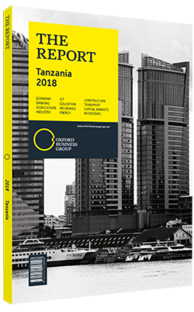Tanzania's new draft budget seeks to advance industrial activity
The draft budget for FY 2017/18, tabled on June 9, 2017 by the Ministry of Finance and Planning (MoFP), aims to raise real GDP growth to 7.1% in 2017, up from 7% the previous year, while shrinking the budget deficit from 4.5% to 3.8% of GDP, and keeping inflation between 5% and 8%. A country of 53m, Tanzania remains one of the strongest economies in the EAC, with the IMF forecasting GDP growth of 6.8% in 2018 on the back of robust industrial growth.
Government Support
Under the theme of “Industrialisation for Job Creation and Shared Prosperity”, the government’s new TSh31.7trn ($14.4bn) spending proposal includes projects such as a new standard-gauge railway line, renovation of Air Tanzania, new special economic zones to draw industrial investors and a $30bn liquefied natural gas plant in partnership with international oil majors.
The draft also proposes fiscal policies to stimulate industrial growth, which has hovered around 8% annually over 2012-17 and accounts for as much as 25% of GDP, according to investment portal Tanzania Invest. There is a proposed cut in corporate income taxes for new assemblers of vehicles, tractors and fishing boats, from 30% to 10% for the first five years of operation. There is a proposed value-added tax exemption on procurement and import of goods to make edible oil, textiles, leather and pharmaceutical products, which is expected to support small and medium-sized industries. Import duties on certain goods would also be reduced or eliminated.
In May 2017 the Ministry of Lands, Housing and Human Settlements Development announced plans to allocate 33,600 ha of land for industrial development in coming years, saying it had provided roughly 7700 ha for this project in FY 2015/16.
New Revenue Streams
Although these measures offer critical support for long-term industrialisation, the budget also includes ambitious revenue collection targets, with tax and duty increases on certain goods. In its FY 2017/18 draft budget the MoFP proposed several revenue-boosting changes, including import duties on flat-rolled iron and steel products increasing from 10% to 25%, or $250 per tonne, whichever is higher; duties on paper products jumping from 10% to 25%; and taxes on aluminium products being introduced for the first time at 25%.
Other measures would affect beverage producers: import taxes per litre would rise on soft drinks and bottled water from TSh58 ($0.026) to TSh61 ($0.028) and on beer made with local ingredients from TSh429 ($0.195) to TSh450 ($0.205). Excise taxes on all other beer would jump from TSh729 ($0.33) to TSh765 ($0.35), and on non-alcoholic beer and energy drinks from TSh534 ($0.24) to TSh561 ($0.26).
Tax Hike Pressure
This is expected to affect consumer spending. According to the Confederation of Tanzania Industries (CTI), a similar move in FY 2012/13 that raised excise duties on beer by 25% caused an 8% fall in sales for local producer Serengeti Breweries, which ultimately reduced state revenues. As retailers tend to pass such costs on to consumers, the CTI has argued against the move, saying that maintaining current rates would actually boost tax revenue on beer, currently at around TSh65bn ($29.6m). It calculates that a 5% increase in sales volume can lead to a 15% rise in government revenue.
Balancing Budgets
A recent budget brief from consultancy KPMG reports that as of April 2017 the government had collected TSh29.5trn ($13.4bn), 70% of target revenue for FY 2016/17, while spending had reached TSh15.4trn ($7bn), or 87.4% of the target. Development expenditure was TSh4.5trn ($2bn), just 38.5% of the budget, highlighting the importance of revenue realisation and tax regime stability.
While Tanzania has managed to avoid many travails other African markets have faced over 2016-17, the draft budget underlines the government’s desire to aggressively limit any weakening in public finances.
You have reached the limit of premium articles you can view for free.
Choose from the options below to purchase print or digital editions of our Reports. You can also purchase a website subscription giving you unlimited access to all of our Reports online for 12 months.
If you have already purchased this Report or have a website subscription, please login to continue.

